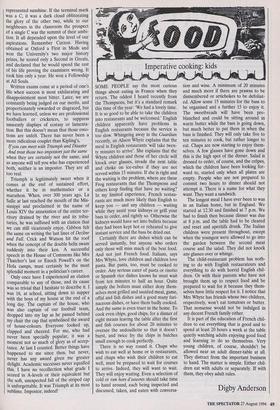Imperative cooking: kids LPL . ,„flimIJOALJOLOL0 SOME PEOPLE say the most
curious things about eating in France when they return. The oddest I heard recently from the Thompsons, but it's a standard remark this time of the year: 'We had a lovely time. It is so good to be able to take the children into restaurants and be welcomed.' English children apparently have problems in English restaurants because the service is too slow. Whingeing away in the Guardian recently, an Alison Whyte explains that the meal in English restaurants 'will take twen- ty minutes to arrive'. She explains that the Whyte children and those of her circle will knock over glasses, invade the next table and choke on ice-cubes if they are not served within 15 minutes. If she is right and the waiting is the problem, where are these Frog restaurants that the Thompsons and others keep finding that have no waiting? In my limited experience, French restau- rants are much more likely than English to keep you — and any children — waiting while they sauté your kidneys or grill your bass to order, and rightly so. Otherwise the kidneys would have set into bullets because they had been kept hot or reheated to give instant service and the bass be dried out.
Certainly there are dishes which can be served instantly, but anyone who orders only those will miss much of the best food. And not just French food. Italians, says Mrs Whyte, love children and children love pasta. But pasta, too, must be cooked to order. Any serious eater of pasta or risotto or Spanish rice dishes knows he must wait from ten minutes to half an hour. Quite simply the bolters must either deny them- selves most grilled and sautéed meat, game, offal and fish dishes and a good many fari-, naceous dishes, or have them badly cooked. And the same is even truer in the home. To cook even chips, good chips, for a dinner of eight means leaving the table after the first and fish courses for about 20 minutes to oversee the andouillette so that it doesn't burst, and twice fry the chips in batches small enough to cook perfectly.
There is no way round it. Chaps who wish to eat well at home or in restaurants, and chaps who wish their children to eat well, must be prepared to wait for courses to arrive. Indeed, they will want to wait. They will enjoy waiting. Even a selection of cold or raw hors d'oeuvres should take time to hand around, each being inspected and discussed, taken, and eaten with conversa- tion and wine. A minimum of 20 minutes and much more if there are prawns to be dismembered or artichokes to be defoliat- ed. Allow some 15 minutes for the bass to be organised and a further 15 to enjoy it. The sweetbreads will have been pre- blanched and could be sitting around in warm butter while the bass is going down, but much better to put them in when the bass is finished. They will only take five to ten minutes to cook, but rather longer to eat. Chaps are now starting to enjoy them- selves. A few glasses have gone down and this is the high spot of the dinner. Salad is dressed to order, of course, and the crepes, which the children have been looking for- ward to, started only when all plates are empty. People who are not prepared to commit two hours to dinner should not attempt it. There is a name for what they want. They want a sandwich.
The longest meal I have ever been to was in an Italian home, but in England. We started at 12.30 and finished at 7 p.m. We had to finish then because dinner was due at 8 p.m. and the table had to be cleared and reset and aperitifs drunk. The Italian children were present throughout, except when the youngest were allowed to go into the garden between the second meat course and the salad. They did not knock any glasses over or whinge.
The child-restaurant problem has noth- ing to do with English restaurateurs and everything to do with horrid English chil- dren. Or with their parents who have not brought them up to respect food and be prepared to wait for it because they them- selves have little respect for it. I notice that Mrs Whyte has friends whose two children, respectively, won't eat tomatoes or butter. That nonsense would not be indulged in any decent French family either.
It is part of the education of French chil- dren to eat everything that is good and to spend at least 20 hours a week at the table quietly watching adults enjoying good food and learning to do so themselves. Very young children, of course, shouldn't be allowed near an adult dinner-table at all. They distract from the important business to hand. The matter is simple. Either chil- dren eat with adults or separately. If with them, they obey adult rules.
Digby Anderson


























































 Previous page
Previous page